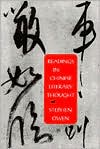

 |

|

The average rating for Readings in Chinese Literary Thought, Vol. 30 based on 2 reviews is 5 stars.
Review # 1 was written on 2009-12-24 00:00:00 Ray Smith Ray SmithOne old Chinese tale tells of a Daoist hermit who was given to meditation in his small bamboo hut, which was lost among waterfalls and mountain mists. One day some dour-faced Confucians made their way to his hut, stepped inside, and saw him sitting there stark naked, abandoned in meditation to the immensity of the Dao. "What are you doing, sitting there in your hut stark naked?" the Confucian do-gooders queried. The Daoist slowly opened his eyes. He looked out at the Confucians, and replied, "This whole universe is my hut. This little hut is only my pants. What are you guys doing inside my pants?" There the story ends, but not really, because tales of such repartee between Daoists and Confucianists have been told for centuries. Daoism and Confucianism, in fact, form one of the fundamental dyads underlying much of Chinese thought. Always at odds with each other, they nevertheless need each other, like yin and yang. One of the most important Mandarin words is wen (文), which forms half of another influential dyad in early Chinese philosophical, literary, political and aesthetic thought. Wen means 'literature,' 'letters,' 'diplomacy.' The other half of that pair is wu, 'war.' In political thought, the Chinese have long disesteemed wu and favored wen. This is evident from the time of the Laozi ("I would rather retreat a mile than advance an inch.") and the Zhuangzi (Discoursing on Swords) to contemporary elaborations such as those of Jet Li. For centuries, passing the civil service exams, the gateway to a meaningful career, required that one be steeped in the Confucian classics and other exemplars of wen. In music and poetry, the wen/wu dyad reappears in the distinction between more lyrical (wen) passages and more abrasive (wu) ones, the haunting "Song of the Pipa" is an excellent example. Stephen Owen's Readings in Chinese Literary Thought contains masterful essays and commentaries on the foundational texts underlying the long tradition of wen, including both Confucian and Daoist sources. This work is useful not only to scholars of Chinese literature, but to all writers for its ability to lead the mind into important considerations that otherwise might never take place. |
Review # 2 was written on 2013-11-20 00:00:00 Lawrence Clark Lawrence ClarkOne old Chinese tale tells of a Daoist hermit who was given to meditation in his small bamboo hut, which was lost among waterfalls and mountain mists. One day some dour-faced Confucians made their way to his hut, stepped inside, and saw him sitting there stark naked, abandoned in meditation to the immensity of the Dao. "What are you doing, sitting there in your hut stark naked?" the Confucian do-gooders queried. The Daoist slowly opened his eyes. He looked out at the Confucians, and replied, "This whole universe is my hut. This little hut is only my pants. What are you guys doing inside my pants?" There the story ends, but not really, because tales of such repartee between Daoists and Confucianists have been told for centuries. Daoism and Confucianism, in fact, form one of the fundamental dyads underlying much of Chinese thought. Always at odds with each other, they nevertheless need each other, like yin and yang. One of the most important Mandarin words is wen (文), which forms half of another influential dyad in early Chinese philosophical, literary, political and aesthetic thought. Wen means 'literature,' 'letters,' 'diplomacy.' The other half of that pair is wu, 'war.' In political thought, the Chinese have long disesteemed wu and favored wen. This is evident from the time of the Laozi ("I would rather retreat a mile than advance an inch.") and the Zhuangzi (Discoursing on Swords) to contemporary elaborations such as those of Jet Li. For centuries, passing the civil service exams, the gateway to a meaningful career, required that one be steeped in the Confucian classics and other exemplars of wen. In music and poetry, the wen/wu dyad reappears in the distinction between more lyrical (wen) passages and more abrasive (wu) ones, the haunting "Song of the Pipa" is an excellent example. Stephen Owen's Readings in Chinese Literary Thought contains masterful essays and commentaries on the foundational texts underlying the long tradition of wen, including both Confucian and Daoist sources. This work is useful not only to scholars of Chinese literature, but to all writers for its ability to lead the mind into important considerations that otherwise might never take place. |
CAN'T FIND WHAT YOU'RE LOOKING FOR? CLICK HERE!!!